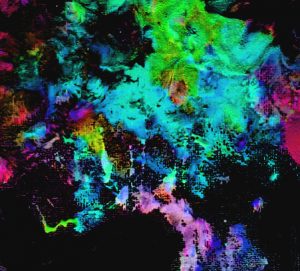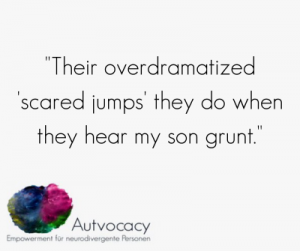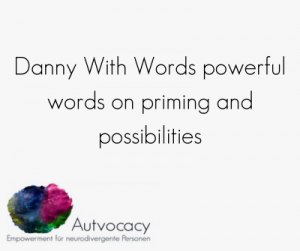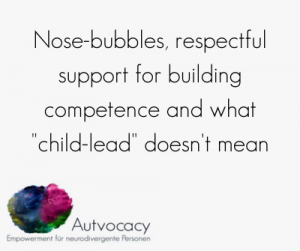A response to Peter Gray: children who seem to direct play aren’t tyrants – about harmful narratives that marginalise neurodivergent play

I’d like to share my thoughts on a specific part of this post by advocate and researcher Peter Gray. It’s a post where Peter Gray, whose work on play and child-lead learning has been invaluable, examines the dynamics between parents and young people when parents join play without actually enjoying it, with resistance to it. It’s an important topic and I won’t speak to most of it.
Because I think Peter Gray’s work is so important and – hopefully – influential – I’d like to focus on a few words Peter Gray used a an introduction to his latest post on his facebook page. Therein, he described kids who tell their parents what to say and do in play as “little tyrants”.
While I agree that joining with resistance and hold ups gets in the way of deeper connection and joy and is worth examining – something I talk a lot about in my own work – I object to the analysis that directing the way parents (and others) play is tyranny, as well as in the suggestion that this cannot lend itself to real play. I think such conclusions lack anti-discrimnatory information around various neurodivergent play modes and needs, around underlying sensory processing differences and neuromotor differences, around monotropic processing, around the need for predictability, around anxiety and constant experiences of overwhelm in a neuronormative world – and dehumanises the very real, beautiful and valid play needs of yong people in various neurominorities.
I’d urgently like for us to consider that most play cultures are neuronormative. In my work, I center neurodivergent play needs and cultures, and it’s my experience that most of us lack basic competences in creating safe space for truly neurodiverse play.
The way we learn to accommodate and foster play is centered around neuronormative play cultures.
Many neurodivergent young persons experience the world most intensely through play, and they need play to be foreseeable. In worlds that are constantly overwhelming, that overpower their sensory processing, that don’t meet their movement needs, that have little room for their access movements and neuromotor differences, play should be the one safe way to connect.
Autistic young people in particular as well as other monotropic processors and Gestalt processors may need play to follow scripts. They often have immensely rich, specific, episodic play ideas that only work if they are adhered to. On repeat.
Conflicting needs certainly exist, sure, and we need to rethink how we talk about them and who we devalue, who we paint as tyrants and oppressors.
If young people need their safe persons (or others) to follow precise play scripts to access safety and joy, parents (and others) can certainly struggle to join in for a variety of reasons.
They may struggle with sensory overwhelm themselves, they may struggle with auditory processing and may experience the directions as overwhelming; they may have (unrecognised) neuromotor differences that make it difficult to quickly switch motor output – meaning: it may be difficult to just change how they move and what they say. They may just be burned out. They may experience brain fog. They may be exhausted. There may be vary real hurdles or barriers in the way. And this may inhibit experiencing joy.
Truly joining children’s play – typical or neurodivergent – is something that does not come easy to many of us, and I’d suggest that childism, together with neuronormativity, lie at the heart of this. It’s important we talk about, it’s important we examine what prevents us – and I appreciate Peter Gray’s open reflection.
I’d like to venture that truly joining neurodivergent young people’s play may come even easier, and that some of that has to do with what we aren’t used to, with what is not being valued in society, by narratives that inhibit us, by lack of space for young people, as well as a lack of competences – in the sense that we aren’t encouraged to build the kinds of competences that fosters a thriving environment for diverse types of play.
I certainly experience overwhelm at one point or another when a young person has specific (vibrant!) play ideas and I may struggle to follow. But this is our responsability to take, our accountability, our things to look at, hold space for and work on.
The go-to reaction to young people with neurodivergent play cultures and needs cannot be to devalue these play modes. To paint them as tyranny and thereby as oppressive, as too much. To devalue this type of play as not-real-play.
One big hurdle in people joining – and experiencing joy – in scripted and repetitive seeming play is the way we learned to think about it, is the alarm people feel, alarming thoughts of tyranny, of kids being controlling, being unkind, not caring about others.
These are incredibly unhelpful and simply wrong projections, ableist tropes that I’d venture none of us are free of. But instead of fully tapping into them, instead of turning them into facts, it’s up to us to recognise these as what they are and counter them with neurodiversity based information – around why this play exists, what it does, which factors play into it, what kinds of skill building, connection and co-regulation it serves.
It’s our responsability to deconstruct the ableism and childism we run with.
And come to realise that these play invitations are truly beautiful, are the most natural way for the specific young person to build (social as well as other) competence, to learn and that they offer incredible opportunities for deep connection and joy for everyone.
Rather than encouraging more resistance to it and devaluing it, we can build competence in creating actual room for neurodiverse play.
I’m a multiply neurodivergent person, parent and coach and in my work, I support neurodivergent young persons and their families.
My focus is on neurodiverse play cultures.
And my experience is that parents are actually relieved when they are supported in fully joining – and understanding – their young person’s quite specific and inflexible seeming play needs. Where we let go of one person sacfricing their needs and self to satisfy another – that kind of language and narrative is devaluing and frankly discrminating, it doesn’t do anyone justice.
We can acknowledge everyone’s hold ups without further marginalising neurodivergent young people.
When we give people the tools to join, to connect while paying attention to their hold ups, to their needs; when we give them tools to fully respect neurodivergent young person’s play needs and see them for the rich invitations they are – we can foster amazing connections and joy.
Today, I read a person complain about a young person who was “never taught to respect others” “whose every wish was met” “who is anti-social”. When people asked, it turned out the this person came to these conclusion because the kids parent didn’t take them to play grounds – after those outings didn’t go well.
Very often, what’s behind opinions like this is misinformation and neuronormativity.
I don’t know the child in question, so I won’t speak to the truth behind this particular experience.
I will speak, however, to this:
many spaces are not welcoming to young neurodivergent persons, particularly to neurodivergent play cultures and play needs. In fact, the marginalisation and invalidation of these kinds of monotropic play needs lie at the center of most experiences of ableism, discrimination and exclusion for neurodivergent young people.
There often is very real trauma and experinces of exclusion and discrimination – of being perceived of as tyrants for the very way one plays, one interacts and exists (while it’s being incredibly misunderstood and misread) – including in one’s safe spaces.
Divergent sensory processing, divergent motor processes are rarely included and acccommodated. When young people’s bodies do unintentional movements, when they are dysregulated, when their specific play needs aren’t met, the young person is usually blamed.
When parents of neurodivergent children create and ask for accommodation, it is quite often read as making everyone bend to the young neurodivergent person’s will.
Very rarely are any of these narratives true. Instead, they comprise judgement where there is a lack of accurante, anti-discriminatory information. When there is a lack of competences, when there isn’t inclusion.
When you see a parent accommodating their dysregulated young person’s need, when they cannot access play grounds and play groups, and your first and second impulse is to judge them. To presume it’s the accommodation itself that “causes” the behavior. That there is anything anti-social going on, I urge you to sit back and learn.
Harmony between different needs does not come about when we deny the validity and origins of needs.
Self-regulation – the ability to process distressing situations and come into a flow state that aligns with one’s intention – is learned through co-regulation.
Co-Regulation may very well look like constant soozing and appeasing to the uninformed.
Let’s sit down and learn more, for a more inclusive world.
And in the meantime: if you kid asks you to follow scripts, if your kid wants to repeat the same script over and over again, if your kid directs your play – and you struggle, let’s talk about it. There might be very real reasons why you aren’t able to experience joy in this (yet).
I can tell you this: when we look at our underlying needs, at hindering narratives and fears, when we uncover some of our resistance, and we find ways for us, for you to join with less of it, there is a world of connection, joy and co-regulation underneath.
We set boundaries all the time. If you truly cannot join, you cannot join. But let’s not fault our kids play beautiful, yet divergent play needs for when we aren’t able to join in the ways they’d actually need to thrive.
And please, let’s get rid of the idea of kids turning to tyrants for having their needs met altogether. It’s high time to not repeat that trope.
And whenever you CAN join, but wonder whether you should: please enjoy this beautiful connection and opportunity to thrive.
I’d like to share my thoughts on this post by advocate and researcher Peter Gray. While I appreciate Peter Gray’s work for children’s play so much, I disagree with his description of kids who tell their parents what to say and do in play as “little tyrants” (!!!) and his conclusion that joining this kind of play isn’t real play.
This kind of analysis is incredibly misinformed around various neurodivergent play modes and needs, around underlying sensory processing differences and neuromotor differences, around monotropic processing, around the need for predictability, around anxiety and constant experiences of overwhelm in a neuronormative world – and dehumanises the very real, beautiful and valid play needs of yong people in various neurominorities.
Peter Gray’s latest post misses a neurodiversity informed lense and it’s disheartening to read his use of the all too familiar, childist, and ableist language of tyrany around children’s play needs.
I’d urgently like for us to consider that most play cultures are neuronormative. In my work, I center neurodivergent play needs and cultures, and it’s my experience that most of us lack basic competences in creating safe space for truly neurodiverse play.
The way we learn to accommodate and foster play is centered around neuronormative play cultures.
Many neurodivergent young persons experience the world most intensely through play, and they need play to be foreseeable. In worlds that are constantly overwhelming, that overpower their sensory processing, that don’t meet their movement needs, that have little room for their access movements and neuromotor differences, play should be the one safe way to connect.
Autistic young people in particular as well as other monotropic processors and Gestalt processors may need play to follow scripts. They often have immensely rich, specific, episodic play ideas that only work if they are adhered to. On repeat.
Conflicting needs certainly exist, sure, and we need to rethink how we talk about them and who we devalue, who we paint as tyrants and oppressors.
If young people need their safe persons (or others) to follow precise play scripts to access safety and joy, parents (and others) can certainly struggle to join in for a variety of reasons.
They may struggle with sensory overwhelm themselves, they may struggle with auditory processing and may experience the directions as overwhelming; they may have (unrecognised) neuromotor differences that make it difficult to quickly switch motor output – meaning: it may be difficult to just change how they move and what they say. They may just be burned out. They may experience brain fog. They may be exhausted. There may be vary real hurdles or barriers in the way. And this may inhibit experiencing joy.
I certainly experience overwhelm at one point or another when a young person has specific (vibrant!) play ideas and I may struggle to follow. But this is our responsability to take, our accountability, our things to look at, hold space for and work on.
However, the go-to reaction to young people with neurodivergent play cultures and needs cannot be to devalue these play modes. To paint them as tyranny, as oppressive, as too much. To devalue this type of play as not-real-play.
One big hurdle in people joining – and experiencing joy – in scripted and repetitive seeming play is the way we learned to think about it, is the alarm people feel, alarming thoughts of tyranny, of kids being controlling, being unkind, not caring about others.
These are incredibly unhelpful and simply wrong projections, ableist tropes that I’d venture none of us are free of. But instead of fully tapping into them, instead of turning them into facts, it’s up to us to recognise these as what they are and counter them with neurodiversity based information – around why this play exists, what it does, which factors play into it, what kinds of skill building, connection and co-regulation it serves.
It’s our responsability to deconstruct the ableism and childism we run with.
And come to realise that these play invitations are truly beautiful, are the most natural way for the specific young person to build (social as well as other) competence, to learn and that they offer incredible opportunities for deep connection and joy for everyone.
Rather than encouraging more resistance to it and devaluing it, we can build competence in creating actual room for neurodiverse play.
I’m a multiply neurodivergent person, parent and coach and in my work, I support neurodivergent young persons and their families.
My focus is on neurodiverse play cultures.
And my experience is that parents are actually relieved when they are supported in fully joining – and understanding – their young person’s quite specific and inflexible seeming play needs. Where we let go of one person sacfricing their needs and self to satisfy another – that kind of language and narrative is devaluing and frankly discrminating, it doesn’t do anyone justice.
We can acknowledge everyone’s hold ups without further marginalising neurodivergent young people.
When we give people the tools to join, to connect while paying attention to their hold ups, to their needs; when we give them tools to fully respect neurodivergent young person’s play needs and see them for the rich invitations they are – we can foster amazing connections and joy.
Today, I read a person complain about a young person who was “never taught to respect others” “whose every wish was met” “who is anti-social”. When people asked, it turned out the this person came to these conclusion because the kids parent didn’t take them to play grounds – after those outings didn’t go well.
Very often, what’s behind opinions like this is misinformation and neuronormativity.
I don’t know the child in question, so I won’t speak to the truth behind this particular experience.
I will speak, however, to this:
many spaces are not welcoming to young neurodivergent persons, particularly to neurodivergent play cultures and play needs. In fact, the marginalisation and invalidation of these kinds of monotropic play needs lie at the center of most experiences of ableism, discrimination and exclusion for neurodivergent young people.
There often is very real trauma and experinces of exclusion and discrimination – of being perceived of as tyrants for the very way one plays, one interacts and exists (while it’s being incredibly misunderstood and misread) – including in one’s safe spaces.
Divergent sensory processing, divergent motor processes are rarely included and acccommodated. When young people’s bodies do unintentional movements, when they are dysregulated, when their specific play needs aren’t met, the young person is usually blamed.
When parents of neurodivergent children create and ask for accommodation, it is quite often read as making everyone bend to the young neurodivergent person’s will.
Very rarely are any of these narratives true. Instead, they comprise judgement where there is a lack of accurante, anti-discriminatory information. When there is a lack of competences, when there isn’t inclusion.
When you see a parent accommodating their dysregulated young person’s need, when they cannot access play grounds and play groups, and your first and second impulse is to judge them. To presume it’s the accommodation itself that “causes” the behavior. That there is anything anti-social going on, I urge you to sit back and learn.
Harmony between different needs does not come about when we deny the validity and origins of needs.
Self-regulation – the ability to process distressing situations and come into a flow state that aligns with one’s intention – is learned through co-regulation.
Co-Regulation may very well look like constant soozing and appeasing to the uninformed.
Let’s sit down and learn more, for a more inclusive world.
And in the meantime: if you kid asks you to follow scripts, if your kid wants to repeat the same script over and over again, if your kid directs your play – and you struggle, let’s talk about it. There might be very real reasons why you aren’t able to experience joy in this (yet).
I can tell you this: when we look at your needs, when we uncover some of your resistance, and we find ways for you to join with less of it, there is a world of connection, joy and co-regulation underneath.
We set boundaries all the time. If you truly cannot join, you cannot join. But let’s not fault our kids play beautiful, yet divergent play needs for when we aren’t able to join in the ways they’d actually need to thrive.
And please, let’s get rid of the idea of kids turning to tyrants for having their needs met altogether. It’s high time to not repeat that trope.
And whenever you CAN join, but wonder whether you should: please enjoy this beautiful connection and opportunity to thrive.
Neurodivergent scheduling
Neuronormative scheduling can set us up for failure – but what are the alternatives? Dear neurokin, when scheduling an appointment or a social engagement and someone proposes a specific…
A response to Peter Gray: children who seem to direct play aren’t tyrants – about harmful narratives that marginalise neurodivergent play
I’d like to share my thoughts on a specific part of this post by advocate and researcher Peter Gray. It’s a post where Peter Gray, whose work on play and…
Book Discussion of „A Day with No Words“ by Tiffany Hammond (long version)
*See here for a shorter version. Today is the day: The children’s book „A Day With No Words” by autistic author Tiffany Hammond is officially out. Today is also the…
Book Review of A Day With No Words by Tiffany Hammond
Short Version **For a longer discussion of this book, see here. A Day with No Words, by Tiffany Hammond is beautifully written, lovingly illustrated by Kate Cosgrove, and fills parts…
“Their overdramatized ‘scared jumps’ they do when they hear my son grunt.”
This is from a social media response to this important post by Fidgets and Fries whose online work I highly recommend. If you are on Substrack or Patreon, this is…
Danny With Words powerful words on priming and possibilities
If you aren’t already, I cannot recommend following Danny With Words enough. This post is a social media response to Danny’s list about the kinds of preparation and priming that…
Nose-bubbles, respectful support for building competence and what “child-lead” doesn’t mean
This was originally a social media response response/addition to a this beautiful post by my friend and neurokin The Peaceful Swim Teacher that merges with things I’ve been wanting to…





